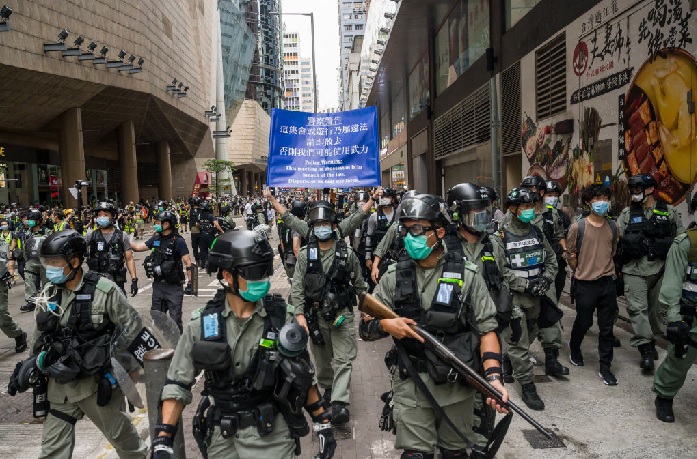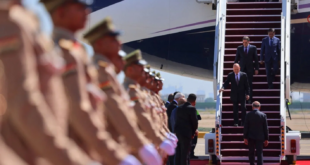
Beijing just imposed a raft of new security measures that will completely undermine the independence of Hong Kong’s own legislature. The new measures will apparently be announced in a few weeks — but one can assume that they include extradition to the mainland and imprisonment.
“In China they never really define what exactly is ‘national security’. So the law could change according to political expediency or political necessity,” Johannes Chan, a legal scholar in Hong Kong, told public broadcaster RTHK, according to The Guardian.
The measures will allow Beijing control over issues such as secession, foreign influence and terrorism which, in the view of pro-democracy activists, is little more than a blatant attempt by Beijing to suppress the anti-government protest movement that brought the territory to a standstill last year.
China’s imposition of a new security law on Hong Kong today is yet another attempt by the country’s communist rulers to make a blatant power grab by exploiting the coronavirus pandemic.
Ever since the deadly Covid-19 virus was first discovered in the Chinese city of Wuhan at the end of last year, China’s ruling communist party (CCP) has been busily exploiting the pandemic to further Beijing’s strategic goals.
The Chinese have, for example, been particularly busy in the South China Sea where, apart from harassing less powerful neighbours such as Vietnam, Malaysia and the Philippines, Beijing last month unilaterally passed measures to strengthen its control over a number of disputed territories, including the Spratly and Paracel Islands, where China’s People’s Liberation Army has constructed a network of illegal military bases.
Beijing has most lately turning its attention to the former British colony of Hong Kong where, in the face of stiff opposition from the territory’s 7.5 million inhabitants, the CCP aims to pass a new set of security laws that critics say will severely undermine Hong Kong’s quasi-autonomous status.
Under the terms of the Basic Law agreement negotiated between Britain and China when Hong Kong was returned to Chinese control in 1997, Hong Kongers have retained a number of basic rights denied to other Chinese citizens, such as freedoms of speech, the press and assembly, and a judiciary system independent of mainland China.
China’s communist dictatorship has never been comfortable with the special privileges enjoyed by the people of Hong Kong, an arrangement known as “one country, two systems.” It is for this reason that Xi Jinping, China’s tyrannical ruler, is seeking to impose a range of new security measures that, if implemented, will severely curtail Hong Kongers basic liberties.
Under Mr Xi’s proposal, passed today by China’s puppet parliament, the National People’s Congress, Beijing imposed a raft of new security measures that will completely undermine the independence of Hong Kong’s own legislature. The new measures will apparently be announced in a few weeks, but one can assume that they
extradition to the mainland and imprisonment. “In China they never really define what exactly is ‘national security’. So the law could change according to political expediency or political necessity,” Johannes Chan, a legal scholar in Hong Kong, told public broadcaster RTHK, according to The Guardian.
The measures will doubtless allow Beijing control over issues such as secession, foreign influence and terrorism which, in the view of pro-democracy activists, is little more than a blatant attempt by Beijing to suppress the anti-government protest movement that brought the territory to a standstill last year.
The Chinese move had prompted a fresh round of anti-Beijing protests in Hong Kong, with the security forces being accused by Amnesty International of carrying out “alarming” attacks on peaceful protesters.
China’s attempt to assert its control over Hong Kong has attracted strong criticism from U.S. President Donald J. Trump, who earlier this week pledged to take action against Beijing over the proposed national security laws. Meanwhile, U.S. Secretary of State Mike Pompeo has warned that the new laws could be a death knell for the “one country, two systems” policy, which guarantees those rights until 2047.
The problem for the U.S. and allies such is Britain is that, so long as Hong Kong’s ruling body, the 70-member Legislative Council, continues to support Beijing’s power grab, there is very little the outside world can do to challenge the territory’s inexorable annexation by China, a point that Mr Pompeo conceded in a terse statement he issued yesterday.
Mr Pompeo revealed that he had informed Congress that Washington no longer regards Hong Kong as an autonomous entity distinct from China, and that it will therefore no longer enjoy the preferential treatment under U.S. law. “No reasonable person can assert today that Hong Kong maintains a high degree of autonomy from China,” said Mr Pompeo.”
There are no doubt many pro-democracy activists in the territory who would like to take issue with this sobering assessment. The sad truth, however, is that China exercises undue influence over the Legislative Council, the body set up to administer the territory in 1997 and which is supposed to uphold the freedoms enshrined in the Basic Law. Chinese control over Hong Kong is further reflected in the fact that it is Beijing, and not Hong Kongers, which appoints the territory’s chief executive, who is currently Carrie Lam.
In an attempt to quell further anti-government protests, Ms Lam earlier this week sought to play down the impact of the new Chinese security laws, claiming that they were a “responsible” move designed to protect the territory’s law-abiding majority.
To add insult to injury, the Legislative Council, in an ill-timed display of solidarity with Beijing, had proposed to pass a contentious bill that would make abusing or insulting the Chinese national anthem, written in 1935 and titled “March of the Volunteers,” a crime. The law would also have required all elementary and high school students to learn the words and to be able to sing the anthem. Apparently however, that proposal has been suspended.
To judge by the response of the protesters, no one in Hong Kong believes that China’s intentions are benign. On the contrary, they see the imposition of the new security laws as a blatant power grab, one they seem determined to resist until the bitter end.
 Eurasia Press & News
Eurasia Press & News



